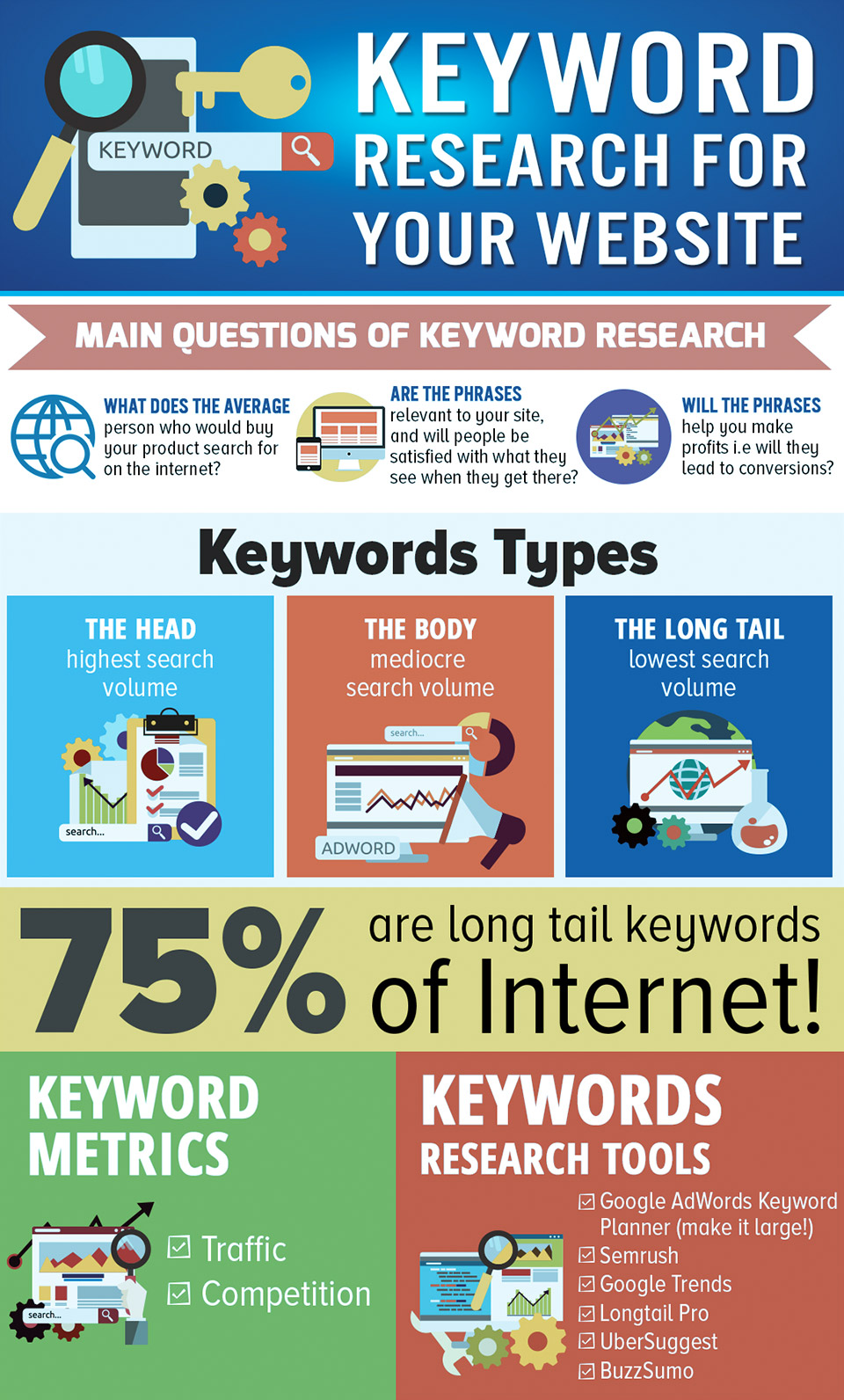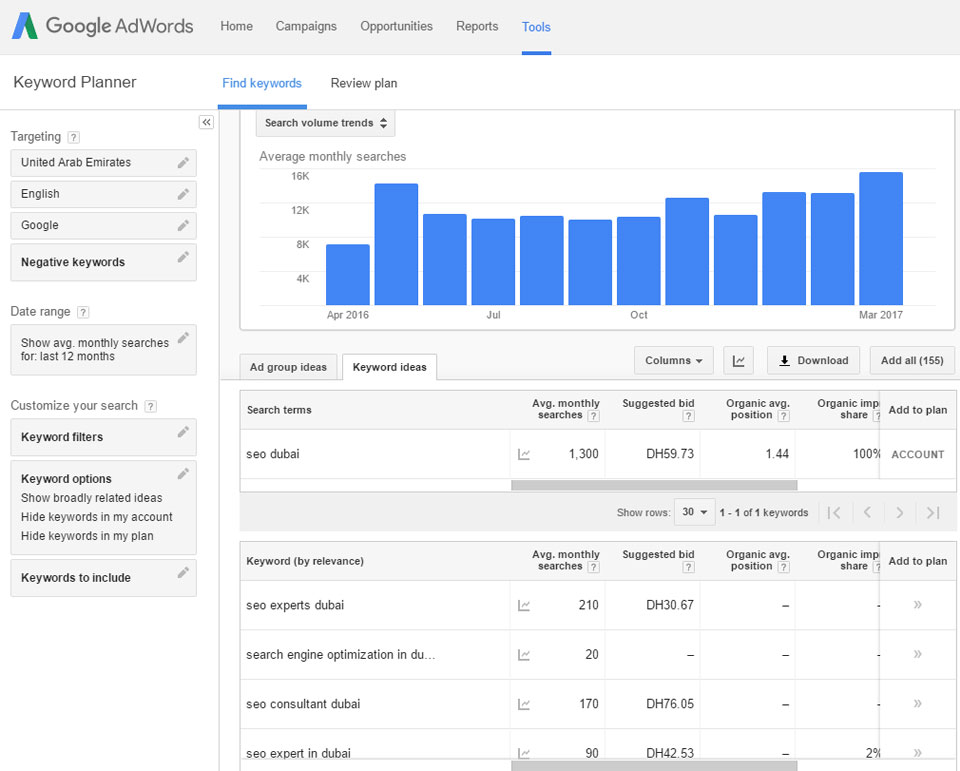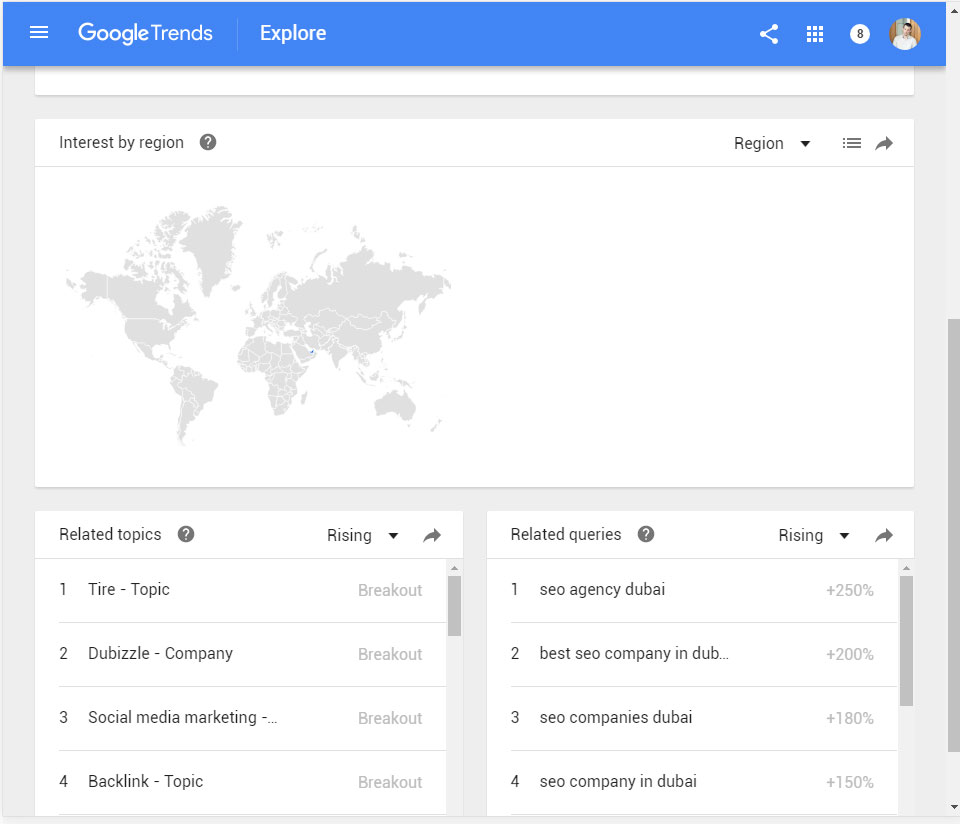Keyword Research for your Website

If you’ve ever dabbled with online marketing, you know that there are perhaps three basic elements to make your pages rank higher. Good content, the use of the best and balanced keywords, and the process of conversion.
Put simply, every business, especially in today’s day and age, wants to rank as high as possible, when people looking for the products or services they sell, enter a search on Google.
This requires some knowledge of the science of SEO, and what runs like a thread through the process are keyword research skills.
In order for you to be able to emerge neck in neck with your main competitors as far as online profile is concerned, and make more profits, the keywords you use will have to retain a good balance of the established principles, and a little out of the box thinking.
In the following, we aspire to deliver the ultimate, all encompassing guide on where to start, what to keep in mind, and how to maximize profit through the use of versatile keywords.
Infographic of Keyword Research

Where To Start
Step 1
The first task has little to do with the Google-based science. At this stage, all you have to do is come up with a laundry list of words and phrases that are relevant to your business.
This means being able to address several aspects of your business, such as:
- What does the average person who would buy your product search for on the internet?
Put yourself in the customer’s shoes. Say for instance, your company makes phone covers, you’re likely to come up with “cheap phone covers,” “durable phone covers,” “phone covers/cases for iphone 7,” and so on.
- Are the phrases relevant to your site, and will people be satisfied with what they see when they get there?
This means being able to use phrases that are relevant in general. For example, if you’ve used the phrase , “phone cases for under AED100,” but all the products on your site are more expensive, using this phrases is not wise, no matter how many searches it gets.
- Will the phrases help you make profits i.e will they lead to conversions?
There is no point in using phrases that receive many searches, but will not help your business sell ANYTHING. This is highly likely to happen when the searches are informational in nature.
For example, if your company sells dog food, people who arrive at your website looking for an understanding of “dog digestion” are unlikely to buy anything, even though among the dog owner demographic, this may very well be a very popular search.
On the other hand, someone who got there looking for “tasty dog treats 1kg” has pretty much already decided they want to buy the product.
Step 2
The second task is converting the content you’ve come up with, into keywords. To avoid confusion, let’s define these as words or phrases that your “potential” customer will enter into Google searches.
For a more purpose-oriented definition, let’s say "searches that will take the customer you’re hunting for, to your competitor's site."
This will involve two important elements: “your niche,” and “claim to fame” (selling points).
The purpose of this stage is a number of things, including ranking better, competing better, and using your specialties to your advantage.
This means using the laundry list of phrases, putting these into Google, and identifying major keywords: phrases your competitors are ranking for.
This will not only help identify entities you need to sweep off their spot, but also how competitive a particular keyword is (represented by many ad spots at the top of the search, and/or seeing huge corporations rank for it).
At this point, the objective is to be able to use the niche, and your claims to fame, to craft keywords for your website. One method is to think of searches people will enter looking for the product you’re currently crafting keywords for.
A lot of companies or boutiques make sell expensive shoes, but what if you’re one of the few that offers high-end shoes made only in Italy? What phrases will you use?
Remember, you have to be able to tick three boxes: many customers search for “the product” using these phrases on Google, rates of conversion are high, and the keywords target your particular niche. This is our list:
- italian designer shoes in dubai
- versatile dress shoes in dubai
- stylish italian shoes in dubai
- handmade designer shoes from italy in dubai
Of course this is easier said than done, and what we have delivered so far, is an outline that is as lay as possible. In the following, we delve deeper into the science behind keyword placement, and deriving higher quality keywords, through understanding how
- long tail and body keywords work
- how your competitors do the same
- refinement, and cleanup, when the core processes are finished.
Long Tail Keywords
Keywords will typically have three sections, the head, the body, and the tail.
The head (highest search volume) refers to the broadest possible classification: music, shoes, software etc.
The body (mediocre search volume) refers to words that add some specificity, albeit a lot less than the tail, and very generally. Examples would look like pop-rock music, designer shoes, antivirus software.
The long tail (lowest search volume) refers to phrases that are very specific, more conversion prone, and reflect the words customers would actually enter into a search engine.
Our view is, that a combination of body and tail words/phrases is the best way to go. While the temptation to use the head is obvious: highest search volume, this also means this is the hardest type to rank for, AND, is the least likely to make you any money.
This is because while there are going to be thousands of searches for boats each day, a heavy majority is unlikely to have the intention or the purchasing power to rent a yacht.
Similarly, people searching for copywriting could have a range of motives, while someone looking for “how to write research-based articles” is several times more qualified, and more likely to subscribe/buy/adopt your service.
The use of good long tail and body keywords requires an appreciation of the purchasing cycle, and combining it with your selling point.
This is crucial because while head keywords bring in the greatest search volume for an individual word, the bunch of long tail keywords considered together is in fact more than 75% of the search volume that converts.
Competitors
Regardless of skill and experience, looking for which keywords one’s competitors are ranking for is a tool every business is going to use.
This is going to act like a grounding exercise for your list. When your competitors are ranking for keywords that you’ve come up with as well, the objective will be to improve your ranking there, but this is not all.
Whether there are keywords your competitors are not ranking for, or those they seem less interested in, this is your treasure trove, especially if these keywords pertain to your unique offerings.
While this means it is important to temper your obsession with all the keywords they are using, ignoring a bucket list of the keywords MOST of them are using will prove disastrous. A balance has to be retained.
Refinement And Cleanup
Buyer Persona
The first aspect of the clean up process is commercially geared, that is, useful if you use SEO in Dubai to promote your business. During this process, three groups of keywords are relevant for consideration.
First, those highest on the commercial intent graph. These are searches (and behind them people) who are as advanced in the sales cycle as possible. This means their searches will include words like: buy, shop, discount, deals, shipping, and even stuff like “buy one get one free.”
You know for almost certain, that anyone who uses these words or that magic phrase is ready to make a purchase. Now while these keywords will convert easily, search volumes will be low, but if your objective is commercial, these are going to play a huge role.
Items
The times people used to visit brick and mortar stores are long gone, and today, most people feel perfectly comfortable buying something without having tested it. This means many people will browse the internet simply looking for more information: specifications, dimensions, price, comparisons, and related things.
Naturally, the conversion rate will be lower than the purchaser keyword group, but it is still significant. This means if you feel your content or website is relevant to a particular keyword that falls into this category, use it!
If your website has tons of geeky background information, and stuff like guides and comparisons all over the place, chances are these keywords will also convert really well, for a particular customer class.
Through illustration, if the search is “office laptops under AED1500,” while your page about the best cheap laptops on the market is meant to provide information, it will play a role in the potential conversion.
In this case, what helped you sell a unit was not a page that sold items, but rather one that was an object of research.
Information
Most keywords on the internet are information based, that is, they were typed by people looking for assistance. These will be preceded by phrases like “ easiest way to,” “how to,” and maybe “home-based remedies for…”
These naturally have the lowest potential for conversion, which means they are unlikely to help you sell anything.
Regardless, the high search volume should not go untapped, and when combined with keywords that do not seem to get too much attention from your competitors, can prove to be an effective tool (think potential for backlinks and prematurely earning customer trust as a reliable forum).
Now that we’ve covered the majority of what it takes to come up with keywords that suit your website’s needs, exploit your niche, and help you maximize conversions, there are metrics, the understanding of which will help you gain a deeper insight regarding how Google works in general, and the ranking process.
Some of these will help your polish your keyword research skills even further.
Other Keyword Metrics
Traffic
This aspect mostly has to do with the understanding that “Google ranks pages, not sites.” In essence, a single page is capable of rendering hundreds and thousands of visitors, if it makes use of the right keywords.
In other words, the process of being able to make a single page rank for multiple, or even several dozen keywords can bring in a crazy amount of traffic, even if the keywords considered individually, bring in lousy numbers.
This refreshes the importance of long tail keywords doesn’t it? At the base of this is the idea that ten people may use ten different phrases to look for essentially the same thing. A page that uses keywords that pertain to those several possibilities will become a coveted resource.
For example, while almost everyone who has a smartphone uses headphones, most people do not understand the difference between in-ear and over-ear models.
This means while some will use the technical phrases, some will search for them having typed “headphones that don’t fall out” or “headphones for full day use.”
Competition
Unless you have a monopoly on a certain segment, chances are your pages are going to have to battle several others before making a mark.
Competitiveness does not necessarily mean letting a keyword go though, and you will inevitably come to realize that while there will be keywords out there, ranking for which is a piece of cake, conversion is almost impossible.
After all, there is a reason why competitive keywords are that hard to rank for in the first place.
This aspect will require a balance, because there are going to be instances where ranking for a difficult keyword is the best way to sell your products, and therefore worth the effort.
SEO Research Tools
As with any other software niche, keyword research too, like other lucrative areas, has online tools, to support speed and optimization.
Although there is a plethora of these tools out there, some of which we don’t explore here, the combination of the available tools two SEO professionals use, will differ. This is because each software has a different interface, and user experience.
Two of the tools: Google Keyword Planner, and Semrush, seem to be extremely popular, and chances are you will find these two on the list of every SEO professional you ask, to rank their favorites.
Google Adwords Keyword Planner
One of the tools every SEO professional will use during research. The tool will help you find related keywords, and its claim to fame is it’s the perfect place to start, because it sets up a convenient pathway from which to polish your results.
When reading about this online, you might find several professionals calling the tool outdated, its data inaccurate, and other subjective criticisms. Despite this, and strangely so, you will find the very same people ranking the tool in their top five.
Some of the criticism is because for one, the search volume it shows only pertains to paid ads, not the keyword in general.
You will hear many other complaints regarding how it falters, but in the end, this software has stood the test of time because of its ability to take head keywords, and make it easy and fast to arrive at searches confined to particular markets.

Semrush
This is one of the most loved, and in fact, most used keyword research tools out there, owing simply to the sheer range of the features it delivers.
While searches elsewhere will start from a bucket list of relevant words, the starting point here is a URL.
Whether this is yours or that of a competing site, the results will churn up the top ranking keywords, making the process of coming up with lethal combinations or body and long tail keywords super easy.
For experienced users, there is even more functionality, including traffic data, CPC, breakdown of each competitor’s targeted keywords, and therefore ideas for which keywords you’re not working with, but definitely should be.
Indeed, the above is a very concise summary of what the program can do, but if you’re looking for one reason to add it to your arsenal, consider that it is hands down, the most popular tool for beginners and experienced professionals alike.
Google Trends
Although less popular than major tools out there, the magic of Google Trends lies in external functions; aspects such as traffic for keywords, breakdown by country, and trends themselves, which prove most useful if you expect certain times of the year (seasons or peak/decline times) to affect your business.

Go to Google Trends
Longtail Pro
We’ve covered plenty of ground on the importance of longtail keywords, and their coveted place in the area of conversions.
This software, although paid, is bound to be a staple in the collection of advanced users, owing to its ability to carry out in-depth keyword analysis, and produce excellent keywords suited to your niche.
Beyond these, depending on who you ask, the top picks will change dramatically. Of course, there are dozens of functionalities out there, all of which are going to take a different place for you depending on your aims, and keyword research experience.
Go to Longtail Pro
UberSuggest, and BuzzSumo are two other widely popular programs, which are bound to appeal to people as they explore, and go further in their SEO journeys.


